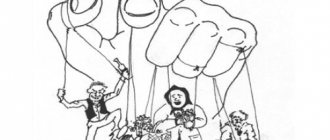Reverse psychology is a method of communication in which one person forces another to do his will. The peculiarity is that this is done through provocation, manipulation, when the individual fulfills the order in reverse, but in the end it turns out that this is exactly the reaction that was expected from him.
Reverse psychology - influencing a person, similar to manipulation
What is reverse psychology?
Reverse or reverse psychology is a term that appeared in the media space relatively recently. In academic psychotherapy it is known as paradoxical intervention. It is a set of tactical psychotherapeutic techniques that, at first glance, completely contradict the goals for which they are intended.
According to the classical interpretation of paradoxical intervention, all its prescriptions should in every possible way reinforce the behavior that the client expects to change, and also imply that this “reinforcement” is the main means of changing behavioral habits. This is how a paradox is created, because the client is encouraged to act in accordance with old habits, while at the same time changing for the better.
In the context of reverse psychology, human motivation is understood as a series of alternating pole states. The choice between these alternative states acquires super-value and is the basis of personal motivation and behavior.
So, the psychotherapist invites the client to behave the way he wants. For example, if he is tormented by laziness and procrastination, which prevents him from working normally, he is encouraged to devote at least an hour a day to these “activities.” The main thing is to do this regularly. In this way, the client is extremely focused on his behavior and its consequences: this will allow him to understand that the behavior is a completely controllable phenomenon.
If the client’s problem is associated with experiencing strong fears, phobias, and imagining physical and mental pain, the use of paradoxical intervention by a psychotherapist may go beyond the scope of medical ethics. In this case, the support of a hypnotherapist may be required: with his help, a person can return to the root causes of the pathology without deliberately replaying this condition. Having analyzed the traumatic conditions of the problem, a person learns to cope with it independently.
We sell cheaper
“Selling” an idea cheaper is another way to plant your idea in someone else’s head. This is another, less aggressive version of reverse psychology. Let's say you are a seller. You sell 250 GB, 500 GB and 1 TB hard drive. A customer comes to your store with the intention of buying what he needs and spending as little money as possible. All buyers want this - to buy the perfect option for almost nothing. Of course, you know this and cannot immediately offer them to buy a 1 TB drive. How to lead a client to a purchase that is beneficial to you?
Your dialogue might look something like this:
Buyer:
Can you tell me about this 260GB drive? I want to make sure this is the right option for me.
Salesman:
What kind of computer do you have and what do you want to use it for?
Buyer:
I have a 2 year old laptop with Windows operating system and I want to use it to store my photos. I have approximately 30 GB of photos.
Salesman:
I think 250 GB will be more than enough to store your photos. Of course, only if you use your laptop exclusively for storing photos. So as long as only photos are stored there, everything will be great.
In the last sentence, you emphasize that 250 GB is enough only for photos, but if you want to store something else... And then you can add that to be sure that in the future this disk will be enough to store other files, you can buy a more spacious version. After all, you care exclusively about the interests of the buyer, and are not trying to sell him something more expensive.
I have another wonderful example from life of such additional sales. Not far from my house there is one of the restaurants of the Celentano chain (Kyiv). And it is in our cafe that there is a simply wonderful bartender who manages to sell you something that you didn’t quite think about buying. Thanks to him, crowds of visitors try new dishes that they were unlikely to try. His work is simply masterful! He does not jabber the standard patter and without expression: “Would you like a pie for dessert? What about coffee? No! While he’s double-checking your order, he, as if by the way, starts talking to you and very unobtrusively tells you that they have one very interesting dessert/pizza/salad/drink (underline as appropriate), and that he tried it himself - it’s very reminiscent of something something from childhood or some other interesting dish that almost everyone has tried. And by the time it reaches full payment, you really want to try this “new and tasty” thing. He also has very flexible hands with long fingers. He moves them so much that I have more than once noticed the fascinated gaze of visitors :) I think he makes half the profit for the entire restaurant.
Now, when I try to go from the “reverse”, I will try to do it not in the form of “passive-aggressive behavior”, but I will beat around the bush;)
Reverse psychology is a phenomenon in which we control another person's behavior by asking them to do or say something completely opposite to what we actually want them to do. “Reverse psychology” is a unique form of manipulation.
1.1 Know who reverse psychology works for. Some people simply do not respond to this method of influence. It mostly affects people who hate being told what to do. A classic example is rebels. The “battle for power and freedom” itself is more important to them than the topic of the dispute. Basically, this works on anyone with a sensitive ego that rises above common sense.
1.2 Wait until the person starts up. Since you need to create an immediate reaction to your words, it is much easier to use reverse psychology on an agitated person. The longer you argue, the more heated the situation, the more important “victory” becomes for the other person.
1.3 Say something opposite to your point of view, but in the same tone. In the end, the person begins to fight not for his idea, but against your attempt to control him. The struggle is no longer at the level of words, but at the level of tones and emotions. For example, if you want to force your neighbor to clean the toilet. At first you made arguments like “You should clean the toilet because it’s dirty” and “I always clean it, you should do it just once.” Now say, “Well, great, don’t ever clean the toilet, I don’t care!” I want people to see how dirty you are in the bathroom! I want people to know what a sloppy pig you are!” Chances are your neighbor will respond with something like, “Don’t tell me, I’ll clean the toilet whenever I want!”
An alternative is to say, “Okay, I give up. You won". Some people admit that they argued only out of a sense of competition. In fact, they didn't want to win so much as to infuriate you and make you bicker longer. When you say they won, they may feel ashamed that they won a battle that meant more to you than to them.
1.4 Press harder. Continuing with the toilet example, say “No! Forget it. I'll throw out all the cleaning products. You don’t use them anyway, and I won’t use them anymore either.” Now you control a person, limiting his actions, and no rebel would like that.
1.5 Call the person's bluff. If he now agrees to do what you originally wanted him to do, but on his own terms, say “I don’t believe you!” Add a few more statements that will hurt his ego, such as “You never finish what you start!” or “You still can’t clean a toilet as well as I can.”
Sometimes you can use this method on its own, challenging the person. “You don’t clean your room because you just don’t know how to do it! I bet you couldn’t keep the room clean for a month!”
1.6 Be prepared to keep your promises. Don't waste words. If you say you won't clean the toilet anymore, don't touch it, and over time your neighbor will see how dirty it really is. If you give in and start cleaning the toilet again, the neighbor will take this as a victory and will argue with even greater fervor in the future. So don't use reverse psychology if you can't stand your ground. Is it worth seeking freedom from responsibilities if it negatively affects your relationships with people? What is more important for peace and tranquility?
Adviсe
Another method of using reverse psychology, which does not always work, is to sternly tell the person not to do what you really want them to do. For example, “Don't under any circumstances eat the carrots I just bought.” Do not explain the reasons for the ban - the secret of success lies in the intrigue. Of course, this is unlikely to work if you forbid something objectively unpleasant, for example, “Do not clean your room under any circumstances.”
Warnings
In arguments with insightful or stubborn people, the obvious use of reverse psychology can lead to backfire because they will understand your train of thought or, conversely, will focus on their point of view to the end. Carefully evaluate who you can use such tactics on so as not to make things worse.
Reverse psychology is a questionable form of communication because you are deliberately using a person's reckless rebellion to benefit yourself. This works well with children, but adults, for the most part, will quickly realize that they are being stupid and prefer a calm, reasoned discussion.
Reverse psychology
(“reverse psychology”)
is a term that describes a psychological phenomenon in which education, propaganda, or inducement to a certain action causes a reaction that is exactly the opposite of the intended one
(opposition or counteraction)
. As a rule, the presence of reverse psychology manifests itself in the commission of actions that are clearly prohibited or contrary to generally accepted norms. Often this behavior serves as an indicative expression of protest and open disagreement with the ban.
Examples of using reverse psychology
The reverse theory describes a psychological phenomenon in which incentives to action, propaganda or educational actions cause a reaction opposite to the expected one.
Sometimes the use of such techniques occurs unconsciously, for example, when parents order their child not to do something, hoping that he will stubbornly do the opposite, doing exactly what they want.
Reverse psychology techniques are clearly demonstrated in books and movies. For example, a person experiences unsolvable difficulties in life and wants to commit suicide. There seems to be no point in dissuading him: after all, this will only confirm his decision. Accordingly, you can try to act “from the opposite”: to let the potential suicide understand that his life is really worthless, the difficulties are insoluble, and only a series of failures awaits him ahead.
Usually at this moment natural human stubbornness kicks in and the one who a minute ago wanted to take a lethal dose of sleeping pills or jump from the roof begins to convince the opponent that all of the above difficulties can be solved, and in general suicide is postponed for now.
Reverse psychology is widely used in relationships between men and women. The most striking examples: a woman wants to marry her partner, and so that he is not frightened by this prospect, she makes it clear to him in every possible way that she does not need marriage, and that the relationship is too boring and burdensome. A man’s pride and possessive instinct awakens: he will not tolerate his beloved woman having such freedom, and will try to do everything in his power to ensure that she accepts his marriage proposal.
Reverse psychology is also widely used in trading. This is the most favorable environment for such manipulations, because the buyer always latently resists the seller’s offer and influence. The most striking examples of using this sales technique:
- forbidden fruit : if a person is told that a particular product is not available, he will want that particular product;
- product evaluation : if you ask the buyer to evaluate the quality of the product, he will diligently look for positive properties in it, as if “selling” it to himself;
- doubt about the client’s solvency and social status motivates him to prove the opposite to the seller and buy the most expensive product.
How to use reverse psychology techniques
It is permissible to resort to this technique in everyday life, communicating with loved ones and work colleagues. But, having chosen it, remember that it is appropriate if dosed correctly.
With baby
A child who is struggling to build his personal boundaries often chooses an aggressive “one against all” position. If you find yourself on the other side of the barricade, arguing with and threatening your child is the worst thing you can do. This is where it makes sense to let go and gracefully employ the strategy of reverse psychology. For example, the phrase “Don’t you dare clean your room: this mess is so in harmony with my mood” can push a teenager to take the opposite action. The main thing on your part is not to humiliate or insult. The phrase should not be accusing, but stating. It is important not to overact so that the child thinks that you are serious and does not see through you.
With your other half
Problems in a couple's relationship always arise. However, if contradictions increasingly develop into scandals, it makes sense to change tactics. The classic scheme: the wife asks her husband to do the man’s housework, but he refuses. What to do? Call a craftsman to your home to finally nail a shelf or hang a chandelier. Having done basic work in a matter of minutes, the master will empty part of the family budget. Typically, this will make the man feel guilty and feel some shame. Probably, next time he will do his best to prove his competence to himself and his wife.
In business
Focus on self-love. This is a powerful motivation lever for employees, which is often practiced by management. It consists of downplaying the staff's abilities, but without humiliating them. This should look like doubt as to whether the employee will reach the set bar. As a rule, a challenge is very motivating to prove professionalism and even exceed the plan.
History of development
The theory of reversibility was developed in the 70s by psychologists M. Apter and K. Smith. It is described in detail in the works “Subjective Experience of Motivation” and “Beyond Personality Traits. Reversible theory of motivation." Initially, the theory was practical: with its help, Apter intended to treat children with schizophrenia.
According to Apter, reverse psychology explains the duality of human nature: at the same moment in time, he cannot feel the desire to perform two actions that contradict each other. For example, dying of thirst in the desert, a person will not want to give his only bottle of water to a stranger begging him for help. Nevertheless, the same theory states that it is human nature to quickly switch from one polar state to another and back again.
In order to achieve the desired reaction, you need to:
- determine the most convenient conditions for manipulation;
- perform a series of actions aimed at encouraging a person to independently move into the state desired by the manipulator and make the decision he needs.
Logic and composure are not always useful
First of all, I advise the reader to read reviews about the nuances of logical thinking and how to become cool-headed. At least in the first of them, the reader learns that much still depends on knowledge.
As they say, there is nothing better than examples, so instead of a thousand words, a hypothetical situation. Let's say the attitude towards yellow price tags . Many people have more than once encountered various tricks and tricks in stores, or at least they have had their ears buzzed about it. Therefore, experience (their own or someone else’s) tells them that such goods must be avoided, preferably kilometers away, etc.
However, in reality, there are many situations when yellow price tags do not have a “hidden cost”, the goods are not expired, they do not have defects, etc..
In particular, it happens that it is necessary to free up a shelf for other products, so it is more profitable to sell the current product quickly in order to supply a more relevant one earlier. If this is a seasonal product, then sometimes discounts arise due to the fact that storing it is a high cost. In some cases, stocks are labeled simply as “good sentiment.” In other situations, this is a one-time product for testing general interest and the price reduction is justified by low demand, not quality.
It may also be that the price has been reduced to attract consumer interest. What's the salt? In such cases, the total receipt is usually formed from many goods. Therefore, a product with a yellow price tag can be truly high-quality (as opposed to “bypass”). Income arises from the fact that there are dozens of others in your basket. Accordingly, in the abstract, if you take only goods with a yellow price tag, then in such a situation you can really save money.
But let me remind you that one does not replace the other. The product may expire, it may have defects, and so on.
In other words, it is worth understanding that logic and composure can be useful, but they do not replace other things, such as additional information, tests (“twist and turn in your hands”), lack of laziness, etc..
And, as usual, always remember common logic and the fact that you have your own head.
Did you like the review? Then it's time to subscribe on social networks and repost!
What kind of people are amenable to reverse psychology methods?
The success of using reverse manipulation depends on the context: it is very important who, on whom and under what conditions uses these techniques.
Psychotherapist Janet Raymond believes that the effectiveness of paradoxical intervention depends much more on the dynamics of relationships than on the character and type of personality. Reverse psychology is much more effective where a person fiercely fights for his independence, freedom and individuality, because in this case he is already emotionally determined to do everything that is forbidden to him.
The group of people most susceptible to paradoxical intervention includes:
- children and adolescents;
- people prone to “rebellion”;
- people with low self-esteem who are sensitive to their own pride (narcissists). The easiest way is to force a person to do exactly the opposite, when the manipulator, with his words, presses on his weak points: a precarious social and financial situation, physical disabilities. This is exactly how many sales techniques work: when a person believes that the seller doubts whether he is able to buy an expensive item, he wants to prove the opposite to him and does exactly what the manipulator needs.
It is much more difficult to apply paradoxical intervention methods on calm, straightforward, conservative people who are accustomed to constant submission. If a person spends his entire life adopting authoritative points of view (parents, boss, head of state, etc.) and perceives them as his own, with a high degree of probability he will simply perceive the words of the manipulator as a direct guide to action, doing exactly as he tells him speaks, not the other way around.
The best time to use reverse psychology methods is the period of the highest emotional uplift of the object of intervention. When a person is calm, he makes logical and balanced decisions, but if he is stressed, the decision is likely to be irrational. When a person is overwhelmed by emotions (anger, passion, delight, rapture of victory), he becomes incapable of critical perception.
Reverse psychology: when is it possible and when is it not?
It is worth noting that due to the specificity of the methodology, its use in resolving domestic disputes is not always effective and appropriate. In some cases, it is generally contraindicated. Reverse psychology is situational in nature, so what, when and to whom you say it is important.
Paradoxical intervention works on:
- a person with a rebellious spirit;
- child in adolescence;
- a person with low self-esteem;
- a person who values doing everything his own way;
- a person prone to displaying strong emotions.
People of this type often do not accept parting words and by any means avoid the role of a follower. It is the spirit of contradiction that prompts them to do everything out of spite. Reverse psychology also works effectively with those for whom it is vital to maintain dignity in a stressful situation and hide their weak points at any cost. This is successfully used by marketers when training staff. When the seller sees that a potential buyer is hesitating, he informs him that they have already been interested in this product and the last copy remains. Another option: hint to the buyer that the product is too expensive for him and that he should look at something budget-friendly. If the client’s pride is hurt, he will purchase the product, even if it is not very important to him or objectively cannot afford it.
What happens if you don't guess your opponent's character type? Returning to the customer example, a customer who does not claim universal recognition and is not ready to argue will simply leave the store. Moreover, the probability that he will want to curl up again in this case will tend to zero.
If we talk about resolving everyday problems, “reverse” psychology is a risky method. Especially if you professionally do not have the skills of psychological influence. There are categories of people who are not amenable to paradoxical intervention.
This:
- People for whom your opinion is unconditional and cannot be challenged;
- People who are comfortable in the role of followers;
- People who tend to have a conservative and inflexible way of thinking;
- People who do not tend to demonstrate their importance.
Due to their psychological characteristics, they will accept and regard your instruction as a guide to action. Therefore, always analyze what is happening in detail. Monitor the situation, act only in relation to “suitable” people and when the surge of the opponent’s emotions is at its highest point. At such moments, the ability to be critical is reduced, and the person is guided by reactions at the level of the unconscious (don’t think about the green monkey again!).
Ways to counter reverse psychology
To effectively resist manipulation, you need to learn to control your emotions. It is important to be able to turn on “emotional coldness” every time there is a feeling that a decision is being made spontaneously, as if something or someone is pushing it. Experts call this ability to think critically in all situations “emotional intelligence.”
That is, as soon as there is a feeling that a decision is being made solely in order to counteract someone’s words, you need to immediately stop, or better yet, temporarily isolate yourself from the person to whom these words belonged.
You cannot begin to act and make important decisions under the pressure of emotions. It’s worth drinking a cup of coffee, analyzing the offer and assessing your personal benefit.
The most difficult thing is to determine the most favorable time for this emotional “time-out”, because under the pressure of feelings a person may not notice for a long time that he is being used.
It is also worth noting that most people do not know what “reverse psychology” is: they use its techniques on an intuitive level. That is why you should not immediately accuse a person of blackmail and manipulation: you need to abstract yourself, calm down your emotions and calmly refuse him.
Who does reverse psychology work for?
To effectively use the reverse psychology technique, you need to know who is more susceptible to psychological pressure. Types of people susceptible to manipulation:
- Rebels, hooligans. This type of people can be manipulated. Training lessons, instructions, advice are useless. A bully does the opposite to spite others. Behavior manifests itself in the actions of teenage children who are commanded by their parents. The child fundamentally does things against the will of the adult. But if a friend asks, the reaction will be positive.
- People who do things for the sake of fame, posturing. The individual will try to do everything contrary to the imposed, generally accepted principles. So he tries to stand out from the crowd. People of this type strive to achieve significant results in various areas of life and amuse their pride.
- People who do principled things. The type of individuals who go against existing principles, forgetting about the consequences.
Reverse psychology works great when applied to people who have a high ego bar. Those who have weak self-esteem are susceptible to the reverse effects of manipulation.
You need to understand that not everyone will do the opposite of what they are advised or told. Reverse psychology is useless for those who do not have their own point of view, they are used to following the advice of others. The practice of opposing actions will not have an effect on those who accept someone else's point of view and then present it as their own.
Reverse psychology in relationships and business
To make peace with your significant other, you can use reverse manipulation. Situations often arise when the other half wants to take a break, because many problems have arisen, they need to unload from the outsider, restore feelings.
The other half of the couple should happily agree. It is necessary to say about the intention to happily leave your loved one to rest. The reaction will surprise the initiator, but will preserve the relationship.
You can influence the time of conception of children. The moment has come, but the wife refuses to do this and offers to wait. To change her decision, you need to agree with the proposal, say that you agree to wait for a period of 2-3 years. Statistics say that in 70–80% of cases, the opinion changes.
In business, reverse psychology is used in sales and communication with staff. If an employee is lazy to work, it is enough to touch his pride and self-esteem by telling him that he will not be able to do anything from the work processes. The main thing is to choose the right moment, show emotions correctly, and the employee will start working harder.
You can manipulate staff, reduce demands on management, expand lists of responsibilities, and improve the environment between team members. Any conflict situation is reduced to nothing if the manager correctly uses the reverse manipulation technique.
Products are sold more successfully when using various reverse manipulation techniques. Sellers point out the buyer’s lack of money in front of other people, talk about the uselessness of the product and try in every possible way to divert attention.
Reverse psychology is an interesting technique based on performing actions opposite to expectations. Sellers encourage people to purchase various goods, managers change employees’ decisions in controversial situations, parents control their children, lovers restore family ties.
The concept of reverse psychology is quite difficult to understand, but in the video, using examples, it is explained as simply and easily as possible. After watching this video, everyone will be able to use the techniques of this type of psychology to their advantage and change their life for the better.










